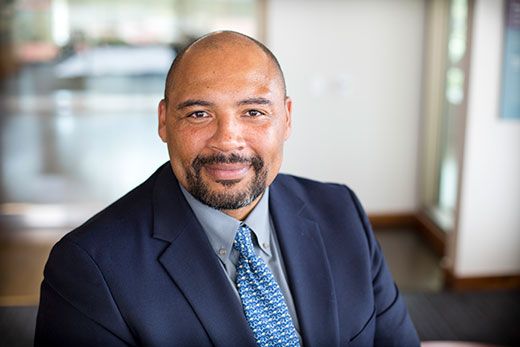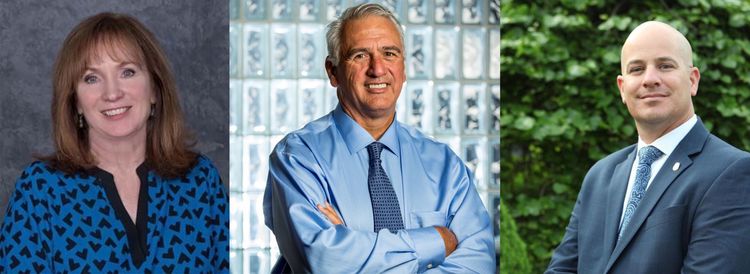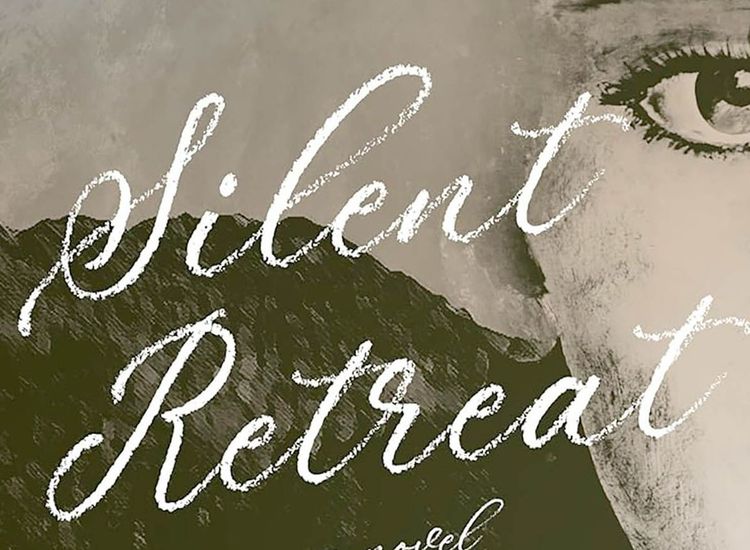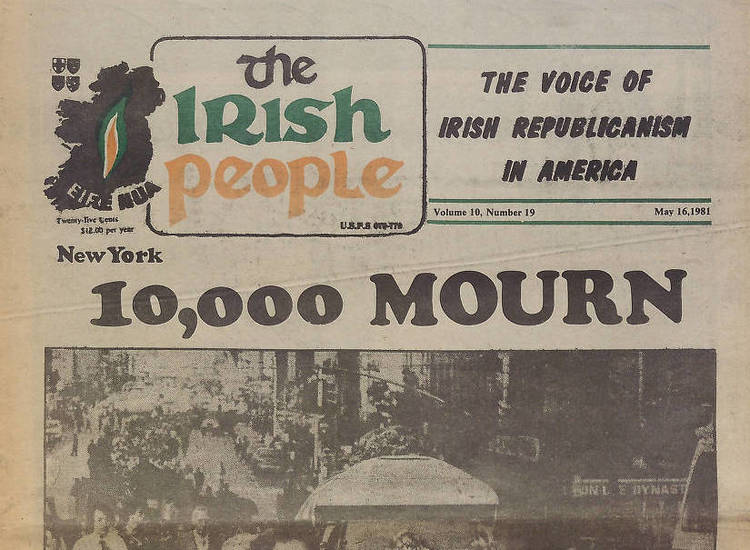Pellom McDaniels III, a professor at Emory University and a former professional football player, died suddenly at home on Sunday morning, April 19. He was 52. Someone I’m very close to drew my attention to this sad event. When she was a teenager, McDaniels’s wife was her Sunday school teacher.
I looked for stories and obituaries about him and the best ultimately was one posted on Emory News the day following his death. It revealed that McDaniels’s NFL career was cut short in 2000, when he was at the Atlanta Falcons, because of blood clots on his lungs. He might then have had a career in broadcasting; he had been a speech communications major at Oregon State and worked at cable television and as a commentator during his five years with the Kansas City Chiefs. A business career, though, seemed the most likely fit, as he’d already created and patented a dental lubricant. However, he knew he wanted to keep learning.
“When I decided to retire from the NFL, I already had a business selling my dental product, Dr. Brizzly. But I realized that I was limiting my opportunities to pursue anything intellectual,” he said in a 2013 interview.
“Because I was an injured reserve for the Falcons, on blood thinners,” he recalled, “I had the opportunity to spend an extraordinary amount of time reading.”
The following day, the 21st, the Fox News website featured a fairly short and straightforward obituary in its sports section, referring in the headline to McDaniels as a former Chiefs defensive lineman and a college professor.
Fortunately, a long comment from someone who appears to have known him professionally remains the first anyone will see of the 152 still attached to the story.
ChildofGodToo found that the summary of McDaniels’s intellectual achievements was rather too brief, but then got to his or her main complaint: “[It is] profoundly disturbing that so many responding to this obituary -- people who obviously never met Pellom -- took the opportunity to denigrate him, African Americans, their (all of our) history, higher education, etc.”
‘Much too young’
ChildofGodToo continued: “I did know Pellom, though not as well as I wish I had. What I know is that he was a kind, compassionate, intelligent, highly accomplished, and humble human being.
“Those who didn't know him or his work are very unfortunate. I'd say you would do well to read some of his poetry and/or scholarship, though I doubt you would understand or appreciate the truth in them.”
The commenter referred to the “ignorance, fear & hatred” displayed by commenters. Indeed, and how revealing that ignorance, fear and hatred proves to be.
I would say that about 40 percent or more of the comments were admiring of McDaniels, and offered condolences and sympathy, and about the same amount were racially charged and in many instances overtly racist. Here are a few from the good people: “An accomplished man, indeed. RIP, sir”; “Remarkable story: great athlete AND great mind!”; “Much too young. Didn’t know he achieved so much.”
And here are a few of the milder examples from the hostile camp: “professor huh ! Now that is TRULY funny !”; “‘College Professor’.....ya right.....you can bet he had his black hand held by enamored liberal mentor professors in order to get through that PhD program in ‘American Studies’ ”; “He only worked in February [a reference, presumably, to Black History Month].”
Another in the angry brigade said that “American Studies” was a euphemism and that people should “Look it up.” Well, I did and it seems that American Studies — the program in which McDaniels got his MA and PhD at Emory — is a broad field that was promoted by the U.S. government overseas after World War II. Under its auspices you could find yourself reading books and scholarly articles about the American Revolution, Andrew Carnegie, the Gettysburg Address, the Wright Brothers, U.S. isolationism before World War II, Ella Fitzgerald or many thousands of other topics.
McDaniels would specialize in African-Americans studies as part of that, just as someone can do an MA in Irish and Irish-American studies at Glucksman Ireland House, NYU, which those of us in the community who know it admire greatly. Twenty or so years ago I did a piece for Newsday about the Italian-American studies program at Queens College, an institution that has an impressive array of ethnic options when it comes to choosing an undergraduate major.
Howard tweet
But with African-American studies — which is surely most central to understanding the American experience — or anything connecting blackness and education, we’re deep into dog-whistle territory. Consider this from a news item in the Washington Post about a tweet from a prominent Florida Republican congressman in late March: “Rep. Matt Gaetz questioned emergency funding being directed to Howard University, suggesting that the allocation does not belong in a $2 trillion bill in a designed to blunt the novel coronavirus pandemic’s effect on the economy.
“‘$13,000,000 in taxpayer funds could be going to families across the nation struggling to put food on the table in the midst of COVID-19,’ Gaetz (R-Fla.) tweeted Wednesday. ‘Instead, it’s going to Howard University.’"
Said the Post, “But there’s a reason money was earmarked for Howard: Because the historically black university was directly chartered by Congress, it does not access the same federal funds as other colleges and universities. It receives an annual federal appropriation and has since the 1920s.”
The paper added, “Gallaudet University was also mentioned in the bill. The university for the deaf and hard of hearing in the District was created by Congress in 1864 and is slated to receive $7 million from the stimulus bill.”
The Hill’s report focused on Howard graduate Senator Kamala Harris’s tweet: “The bill provides $30 billion to protect students and help schools, colleges and universities combat the coronavirus. This is $13 million. $13 million = .04% of $30 billion. Why do you take issue with money going to Howard, Congressman?”
Someone else tweeted: “Howard University has a hospital that has been designated one of DC's coved-19 treatment facilities. It is located 2.1 miles from Rep. Gaetz's workplace.”
And another offered: “The fact that he is tweeting about this and not about the money going to Gallaudet (another federally chartered university, but without a hospital), tells you exactly what he is aiming at. Disgusting.”
ChildofGodToo, who claimed acquaintanceship with the late McDaniels, suggested the very idea of higher education itself was being attacked in the comments section. Well certainly, FullBloodedWhiteMale — a right-wing commenter whose contributions have since disappeared — did write that some forms of education are “useful” and others not (the sciences presumably under his ideal regime would be on notice not to contradict any of Dear Leader’s dogmas). An engineer himself, he didn’t insult the academic who’d just died, but described McDaniels’s area of study as “esoteric.” That, of course, can be taken to refer to the humanities, until recently considered a cornerstone of Western civilization.
Some just don’t like that old-fashioned idea of training the mind through the process of grappling with different perspectives and learning to assess evidence. Ideally one should acquire some humility along the way, too. The poet Patrick Kavanagh had a chip on his shoulder because, unlike many others in his milieu in literary Dublin, he hadn’t gone to university. A friend offered reassurance by telling him that the main advantage of such an education was coming to understand how much one didn’t know. That might, at least in part, help explain McDaniels’s own humility.
Among the books he authored was “The Prince of Jockeys: The Life of Isaac Burns Murphy” (2013), about a son of slaves who became one of the most successful jockeys in horse racing history. Another was “Porter, Steward, Citizen: An African American’s Memoir of World War I” (2017).
Building bridges
McDaniels earned his PhD at Emory in 2007, the college said, with a “dissertation investigating the influence of race, class and sports participation in African American masculine identity. He then joined the Emory faculty in 2012, after serving as an assistant professor at the University of Missouri-Kansas City.”
“Through my participation in sports as an athlete and my scholarly interest in the history of sports in the African American community, I recognized the significance sport has played throughout American history, especially for African Americans in pursuit of equal opportunities for social mobility, political power and economic stability,” he said in 2015.
A curator at Emory’s Rose Library, he was an artist himself. Emory News said that “throughout his academic career, McDaniels sought to build bridges between scholars and the communities they study, conducting research and curating exhibits that had a direct impact far beyond the walls of the university.”
“Pellom McDaniels was a teacher first and foremost,” said Rose Magee, retired director of the Rose Library, who worked with him recently on a project involving artist Benny Andrews and Southern writer Flannery O’Connor. “He taught all of us, his colleagues as well as his students, about the importance of history, of archives, of stories, of art. I’ve never seen Pellom hesitate for a second when there was an opportunity to bring something new to light, to make important things happen, to show us a way forward.
“This is the meaning of Pellom’s life among us: to create, to move, to offer insight as well as change. And now, this is our shared responsibility: to move forward with him in spirit.”
Pellom McDaniels, an adherent of the Baháʼí Faith, is survived by his wife, Navvab McDaniels; daughter, Sofia; and son, Ellington.









